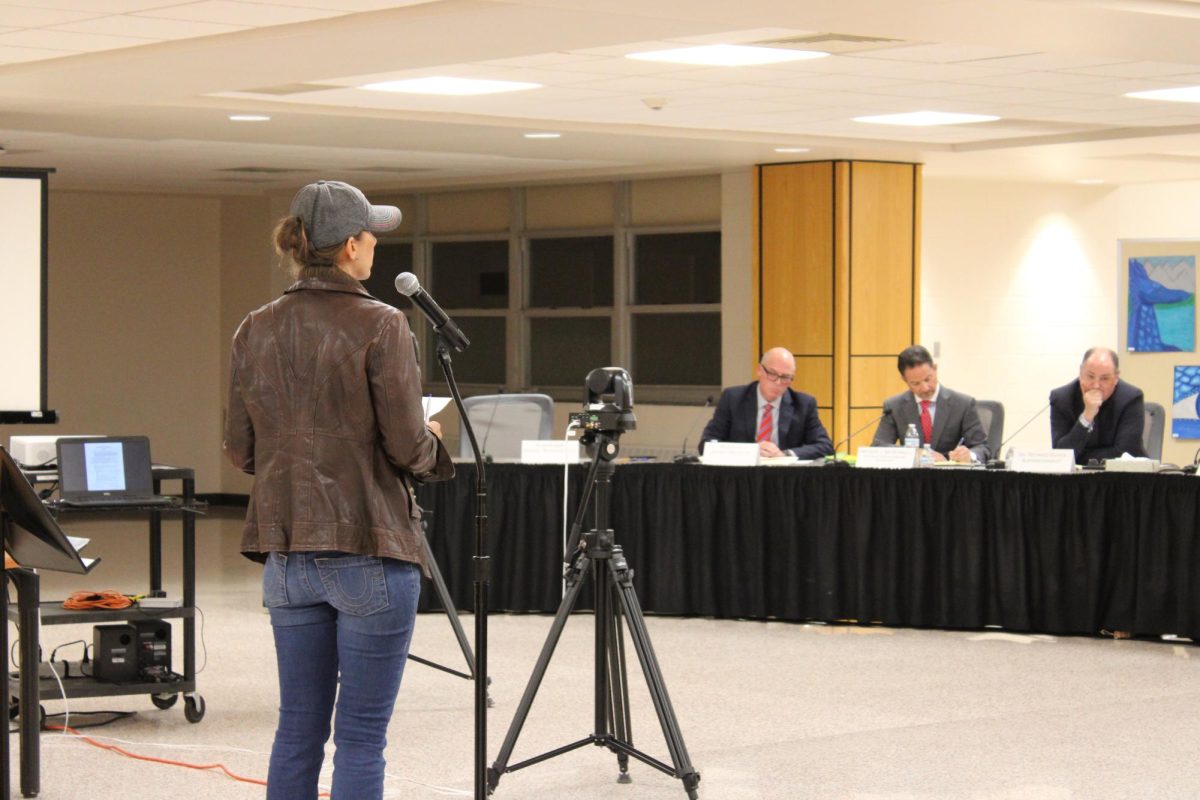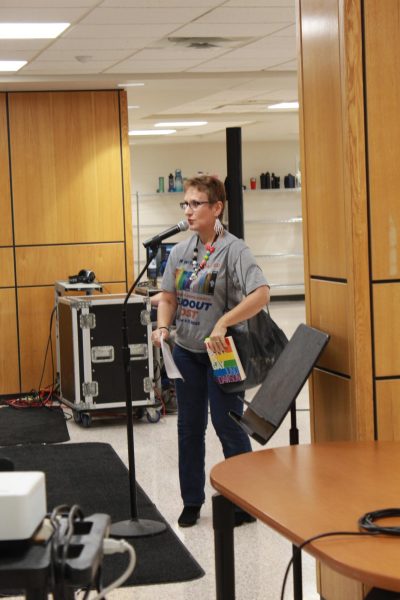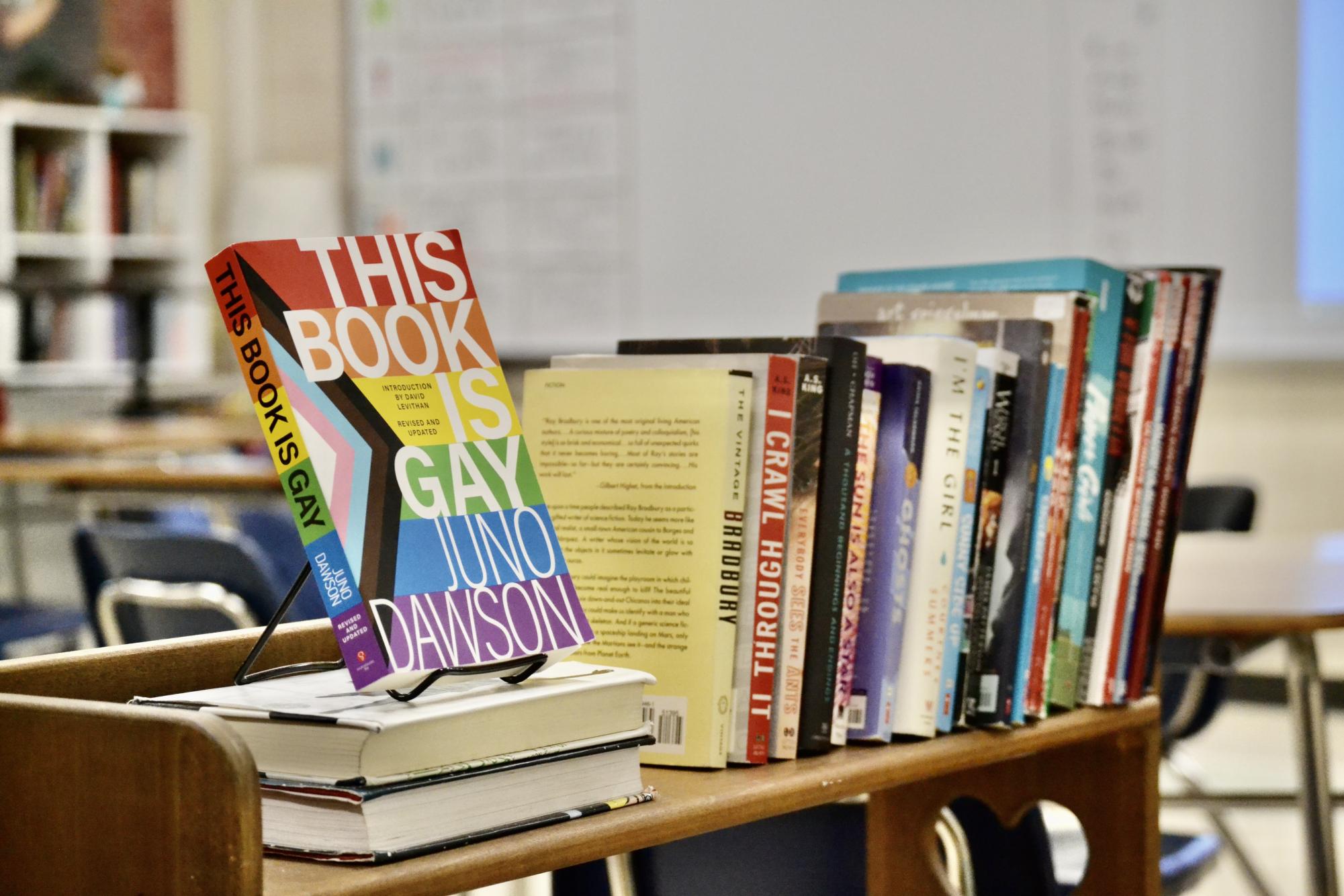By Howard Kim, Maya Shah and Juliana Yao, Co-News Editor, Co-T/E Life Editor and Co-Sports Editor
During the Sept. 26 regular school board meeting, a group of nine Tredyffrin/Easttown parents and residents shared their concerns about alleged discriminatory language toward religious groups in a book in the Conestoga library. As a result, the book in question, the first edition of “This Book Is Gay” by Juno Dawson, is currently under review by the school administration.
Three residents furthered their complaints at the Oct. 23 regular school board meeting, again urging the school board to condemn the alleged prejudice contained in the book. At that same meeting, two community members who did not comment at the first meeting spoke in favor of keeping the book in the library, arguing that LGBTQ+ representation in literature can positively impact students.
Published in the U.S. in June 2015, “This Book is Gay’’ is a young adult, nonfiction work about LGBTQ+ identity and exploration. The book discusses themes such as coming out, LGBTQ+ stereotypes and sexual education.
Dawson includes excerpts from religious texts and explains how to refute their use in arguments against the LGBTQ+ community, most notably in the section “The Gays versus Religion.” Specific contested subsections include “How to Argue with Muslims’’ and “How to Argue with Christians.”
As district resident Dr. Dalia El-Sherif stated at the Oct. 23 school board meeting, “members of the Muslim community have filed a complaint about the religious hate, bias and discrimination in one of the books in the school library” with the school board prior to the Sept. 26 school board meeting.
District resident Bogdan Rosca condemned the “Haterz Gon’ Hate” chapter, in which Dawson describes some religious people as hateful.
“My religious beliefs give credence to the Torah and the Bible, and for this, I am labeled a hater,” Rosca said at the Sept. 26 school board meeting. “The author labels my son a hater, too. (Dawson) calls these parents and their children haters as well because they follow the Quran.”
As outlined in district Regulation 1122, “Complaints Regarding the District,” in the case of resident objections regarding instructional materials, TESD administration first attempts to resolve complaints at the building level.
According to school board president Dr. Roberta Hotinski, Conestoga’s administration is still processing this complaint at the building level. Should the issue not reach a conclusion, Regulation 1122 says that a select committee will examine the content of the material, ultimately presenting its findings to district Superintendent Dr. Richard Gusick to make a final decision.
El-Sherif, the resident who spoke first at the September board meeting, believes that Regulation 1122 does not apply in this situation.
“This material promotes hate, bias and discrimination. Therefore, administrative Regulation 1122 does not apply, as administrative Regulation 1122 does not address hate or discrimination and is focused on complaints against school personnel or instructional material only,” El-Sherif said during the public comment period of the Sept. 26 meeting.
Both Gusick and Hotinski insisted that Regulation 1122 outlined the best method through which to handle the situation and that the book is still under review.
Gusick, Hotinski and Conestoga principal Dr. Amy Meisinger declined The Spoke’s requests for comment due to the ongoing administrative review process.
“As a board, we are concerned about being sensitive to members of every group in our community,” Hotinski said in response to El-Sherif’s comments at the September meeting. “We’ve heard your concerns, and we’re taking them seriously.”
El-Sherif and Rosca did not return The Spoke’s requests for comment.
Residents demand action from school board

At the September school board meeting, nine residents said that “This Book is Gay” causes harm to the Muslim community and urged the school board to condemn the book’s alleged discriminatory language. Kashif Masood, a parent of two students in the district, said that the book’s place in the Conestoga library should be reevaluated.
“We must acknowledge that there is a fine line between the freedom of expression and promoting hate or division,” Masood said at the September meeting. “As responsible citizens and educators, it is our duty to ensure that the materials available in our school uphold the values of respect toward holy religious scripts.”
In her book, Dawson prefaces the passage “The Gays versus Religion” by stating that most religious people are socially progressive and have their own interpretations of religious texts and ideas. While quoting the Quran, Dawson writes that it does not explicitly forbid homosexuality.
Ejaz Sabir, an imam at the Islamic Society of Greater Valley Forge, believes that the Quran does not advocate for the mistreatment of the LGBTQ+ community.
“The Quran does not directly state that homosexuals should be punished whether that means through attacks, hangings, or any other form of violence. However, the Quran does say that every individual will eventually be held accountable for their decisions,” Sabir wrote in a text message.
The Muslim Youth Leadership Council, a national program that brings together young Muslims to fight for LGBTQ+ and Muslim rights, supports the ideas that there are multiple interpretations of Islam.
“One of the most holy, beautiful components of our shared faith is the diversity of our community and our beliefs. We have no single interpretation of our faith; we have varied schools, different sects and hundreds of cultures represented,” the organization wrote in an anti-queerphobia press release on June 29, 2023. “Our very presence affirms the variety of opinions and beliefs held by the Muslim community & Islamic scholarship.”
Rosca found fault in Dawson’s descriptions of some individuals as “clinging to multi-thousand-year-old bits of paper in the name of hate” and aiming to “tear some old religious stuff to shreds.” He identified these quotes as harmful to Muslim students.
“I do ask you to protect the minds, emotional well-being and family values of our children,” Rosca said at the Sept. 26 school board meeting. “You can do that by requiring parental control and parental consent before sharing these books with children.”
At the September school board meeting, parent Dr. Rania El-Desoki related the discussion of “This Book is Gay” to her family’s encounters with perceived religious bigotry.
“That’s not (my daughter’s) job to protect herself or her religion in this school,” El-Desoki said at the meeting. “If it were outside of school that would be different, but in school, that’s not her job because she shouldn’t be put in that situation to begin with.”
Paoli resident Muhammad Bilal said that he was concerned about the book’s language and that Conestoga’s library’s content selection process remained ambiguous. He raised his concerns at the September meeting.
“What is the process you go through to select these books?” Bilal asked the school board during the public comment period. “Why this hatred book was able to reach to that point?”
Conestoga librarians Brooke Hauer and Lydia Lieb select books based on criteria outlined by both the American Library Association (ALA) and the Pennsylvania Library Association.
Hauer and Lieb both affirm the ALA’s assessment that the primary function of books found in school libraries is to “support and enrich the curriculum and/or students’ personal interests and learning,” as stated on the ALA’s website. The organization outlines other guidelines for school libraries, including a need to “represent differing viewpoints on controversial issues.”
“We’ve always followed our selection criteria. It’s not a new process. That’s something we learn in our coursework as certified librarians, and we’ve learned how to go through the process of selecting resources for a high school library,” Hauer said. “It’s not to say we can’t make mistakes, but we try our best for sure.”

How TESD’s book review relates to national trends
According to the ALA’s 2022 list of the top 10 most challenged books in the U.S., “This Book is Gay” was tied as the 10th most challenged book nationally. Major reasons for its controversy included LGBTQ+ content, sexual education and sexually explicit content, as stated by the ALA’s Office for Intellectual Freedom.
The T/E parents’ vocalized concerns are with the book’s alleged anti-religious language, not its LGBTQ+ and sexual content. Rosca criticized how he believes the book approaches the relationship between religious and LGBTQ+ identities.
“‘This Book is Gay’ is itself a message of hate,” Rosca said at the September school board meeting. “It pits two protected classes against each other: sexual orientation and gender identity expressing hate against religion.”
As a parent of an LGBTQ+ child, Lyn McCullen advocated for keeping the book in the Conestoga library at the Oct. 23 board meeting. McCullen specified that, although she did not agree with some ideas presented in the criticized passages, she believes the book’s inclusion in the library still provides valuable representation to LGBTQ+ youth.
“Books like ‘This Book is Gay’ help children find their voice, increase their confidence and become more comfortable with themselves and speaking up for themselves,” McCullen said. “‘This Book is Gay’ helps even just by being on the library shelves. Representation matters.”
Other members of the T/E community emphasize the importance of maintaining unrestricted access to educational materials.
Junior Mariel Hadjiliadis, co-leader of Conestoga’s Gender/Sexuality Alliance (GSA), recognizes the potential offense the book could incite but is wary of the precedent that removing library material could set.
“Our main goal is to keep the book in there because the GSA’s biggest fear is that if they take away one thing, they can take (other) things. If you take it away, you will be harming some students by not having access to a resource like that,” Hadjiliadis said. “We do not want to be offending anyone, whatsoever. It might also be harming some students that are religious or even parents who are religious. That risk is obviously not a happy win-win solution.”
Student leaders of the Muslim Student Association declined The Spoke’s requests for comment.
At the October board meeting, Gina Arlen, a Jewish community member and advocate for Defense of Democracy, a national organization aimed at protecting civil rights, spoke out against restricting student access to information regardless of potential prejudice.
“Only by looking hate in the eyes can we hope to defeat it,” Arlen said at the October meeting. “My religion is strong enough to survive mere words on the page. We’ve been doing it for more than 5,000 years after all.”









